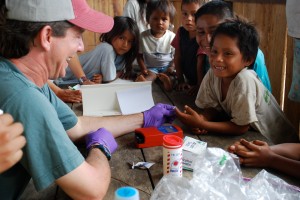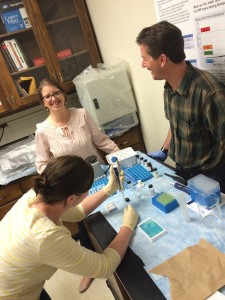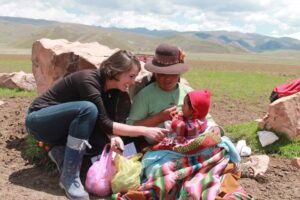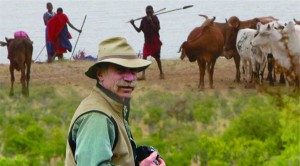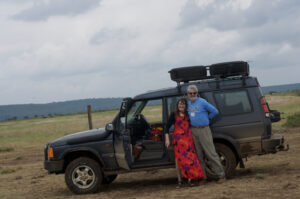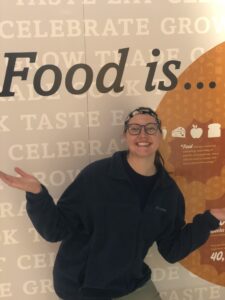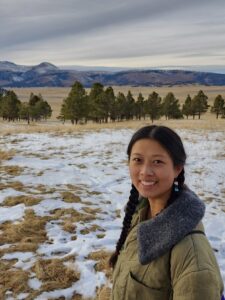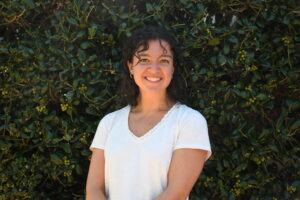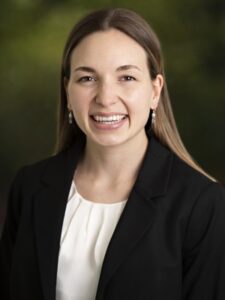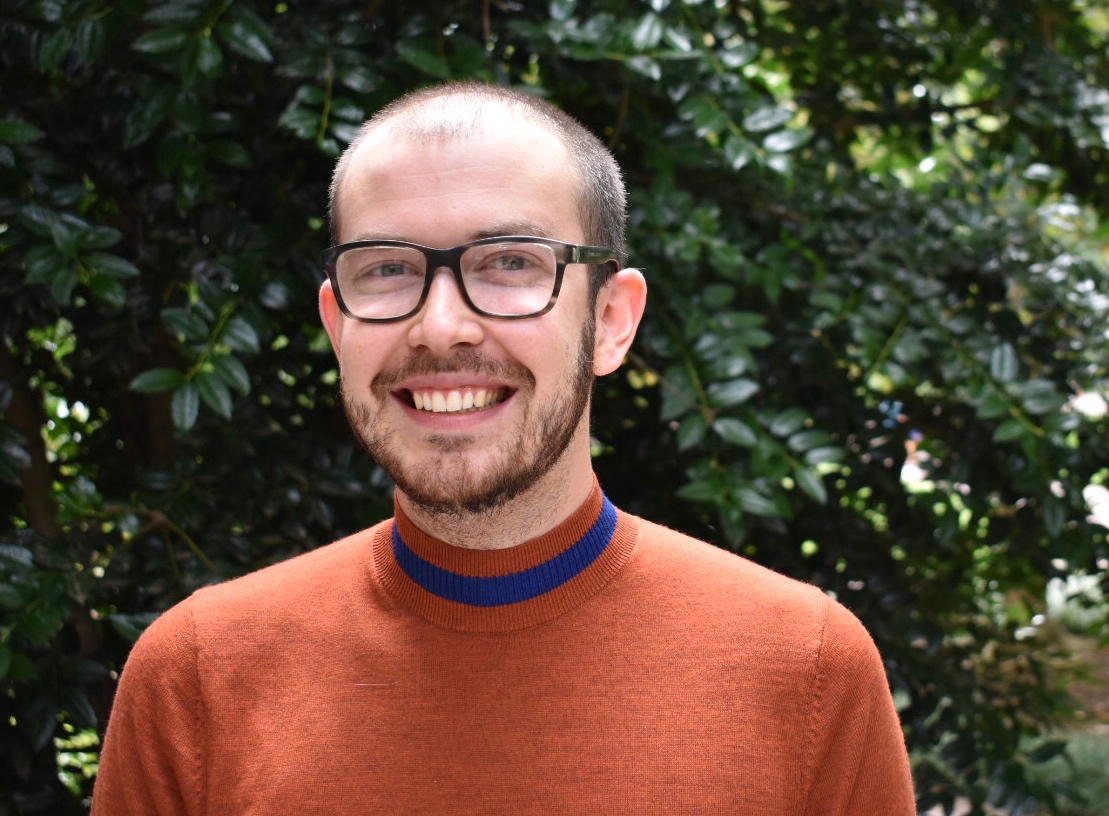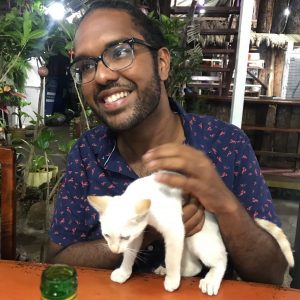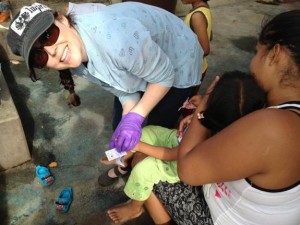Faculty
msorensen@unc.edu
I am a biological anthropologist specializing in biocultural and evolutionary approaches to human variation. My research focuses on the linkages between social and cultural processes, human biology, and health. My research focuses on: inflammation, cardiovascular and metabolic risk; immune function and psychosocial stress; nutrition, growth and immune function. I am particularly interested in the biological impacts of globalization, modernization, and cultural change, in human adaptability and in ecological models for hominid evolution.
althomps@email.unc.edu
I am a biological anthropologist specializing in human growth and nutrition. My research focuses on understanding the biocultural and biomedical influences on growth and physiology during infancy and childhood. I am particularly interested in how early life nutrition and environmental exposures shape long-term health and obesity risk.
My research combines laboratory, anthropological and epidemiological approaches to explore the effects of early environments on growth, body composition, and reproductive development. My work focuses on: sex differences in the association between hormones, body composition, and feeding during infancy; the effects of early diet on the development of the intestinal microbiome as an underlying pathway linking infant feeding and the development of obesity; and the structural, social and maternal and infant characteristics contributing to the development of an obesogenic environment. I am currently examining the physical and social environments associated with the development of inflammation in Chinese children, adolescents, and adults through an NIH K award.
mkhoke@unc.edu
I am a biological anthropologist specializing in biosocial and biocultural approaches to parent and infant health, nutrition, and early growth. My research focuses on the ways in which different forms of inequality get under the skin and affect our health. In particular, I am interested in the effects of uncertainty and precarity when it comes to resources and environments. I have conducted research examining infant feeding practices, illness, and early growth as well as work examining gut health and microbiome composition in a community experiencing rapid economic and nutritional transition in highland Peru. More recently, I have begun to examine the effects of housing insecurity and economic precarity on mental and physical health in the United States.
I integrate laboratory, anthropological, and epidemiological approaches in my work. In the lab, I have validated dried blood spot (DBS) based biomarkers for assessing gut health as well as utilized DBS samples to examine immune function and psychosocial stress. In the field, I deploy ethnographic methods (e.g. interviews, participant observation, and photovoice) alongside biomarker collections to provide new insights into the complex interactions between culture, society, and biology. My upcoming work in Peru, funded by the National Geographic Society, will focus on the effects of climate change on water-related health and economic and production activities as well as examine the strategies people are deploying to maintain their health and wellbeing in the face of climate change-related challenges. In addition, I enjoy science communication and sharing insights on how human biology, shaped by our unique evolutionary past, interacts with current social, political, and economic environments to influence health and wellbeing
Visiting and Affiliated Faculty
pwleslie.unc.edu
I am a biological anthropologist and pursue research on human ecology, especially population-environment interactions in East Africa as part of a series of long-term interdisciplinary projects. A principal focus of this work has been how local peoples respond — biologically, behaviorally, and demographically — to environmental change and unpredictability. Current work centers on the causes and social and ecological consequences arising from the adoption of agriculture and labor migration by semi-nomadic Maasai herding communities in northern Tanzania. A special focus is on how households and communities respond to multiple extreme events – droughts, floods, pandemics, and more.
hiltonch@email.unc.edu
Chuck Hilton is a broadly-trained biological anthropologist with research expertise in the evolutionary history of Neandertals, modern human foragers, northern Kenyan pastoralists, and other small-scale indigenous human populations. He has been involved in anthropological fieldwork in Venezuela, Israel, and the American Southwest as well as analyses of pre-contact northwest coastal Inuit communities. Since 2006, he has been a collaborator with Prof. Bilinda Straight (Western Michigan University) in conducting long-term bio-cultural research projects among the Samburu, a Maa-speaking northern Kenyan pastoralist peoples who are experiencing vast cultural changes related to diet, physical activities, education, access to technology, and lethal violence as their traditional lifestyles become stressed by Westernization and climate change. Our current research is focused on examining the epigenetic effects of maternal in utero-stress seen within Samburu children conceived during the severe drought that hit East Africa in 2008-2010.
Current Doctoral Students
Erin Hosein
Doctoral Student, Anthropology | hosein@unc.edu
I am a first-year doctoral student, and my work centers on the prevalence of food allergies in the US. Using training in nutrition, food studies, and an evolutionary perspective, I am particularly interested in how early-life feeding practices may modulate the risk of food allergies. Additionally, I explore the impact of food policy and recommendations on not only nutrition status but also how these changes affect food practices, customs, and beliefs.
Rebecca Wu
Doctoral Student, Anthropology | rcwu@unc.edu
I am a first-year doctoral student with interests in maternal/child health, the microbiome, and reciprocal human-environment interactions. I am currently interested in exploring novel methods for collecting biomarker data in infants and understanding the intersections of microbiome and human biology research.
Adriana Wisniewski
Doctoral Student, Anthropology | adrianaw@unc.edu
I am a first-year doctoral student interested in studying noncommunicable (particularly metabolic) diseases and risk factors and the relationships to health inequities and social determinants of health on a population level globally. Currently, I am focused on assessing how variations in cardiometabolic risk factors are related to human biological variation and relationships to disease in different populations globally, using a biological normalcy framework. I am also interested in studying autoimmune diseases, especially Type 1 Diabetes.
Preethi Saravanan
Doctoral Student, Anthropology | spreethi@unc.edu
I am a second-year doctoral student interested in studying stress in the Indian diaspora in the US. I am interested in studying health outcomes that particularly impact the community, with an understanding of social factors that exacerbate them.
Doctoral Student, Anthropology | jmackessy1@unc.edu
I am a third-year doctoral student interested in how the birth experience and birth process affects birth outcomes. My research interests stem from my work as a labor doula in the Columbus, OH area from 2019-2020. For my doctoral research, I plan to look at how the birth experience might contribute to birth outcomes such as maternal and infant HPA axis dysregulation, maternal mental health, breastfeeding success, and maternal-infant bonding. I am also a biosocial predoctoral trainee at the Carolina Population Center, where I am working on analyzing interviews from a population of new mothers in North Carolina on their experiences with certain medical interventions during the birth process.
 Joshua Miller
Joshua Miller
Doctoral Student, Nutrition | josh.miller@unc.edu
Josh is a fourth-year doctoral student in the Nutrition Department at UNC. He is primarily interested in how resource insecurities, namely food, and water insecurity, manifest at the household level and impact feeding behaviors. Using data from ongoing studies in the Galápagos and Philippines, he is currently exploring whether water availability, accessibility, and quality issues influence risk of the dual burden of malnutrition across the life course.
Anneliese Long
Doctoral Candidate, Anthropology | annelong@live.unc.edu
Anneliese is a fifth-year doctoral candidate and Carolina Population Center Biosocial predoctoral trainee interested in examining reproductive function from a biosocial perspective. She focuses on how neighborhoods in early life shape patterns in ovarian hormones, epigenetic aging, and chronic inflammation among adults in the southeastern United States.
Doctoral Candidate Anthropology | alkramer@email.unc.edu
Alison is a fifth-year doctoral candidate interested in exploring how the interactions between environmental, social, and biological factors contribute to maternal-infant health outcomes during the first 1,000 days (conception-infant age 2 years) in the United States. Before entering my doctoral program in Anthropology at UNC, I completed my MSPH in human nutrition at the Johns Hopkins Bloomberg School of Public Health.
Andrea Zurek-Ost
Doctoral Candidate, Anthropology | aost@live.unc.edu
Andrea is a fifth-year doctoral candidate, graduate teaching fellow, and Laboratory Coordinator for the Research Laboratories of Archaeology at UNC. Her dissertation research in the Basque Country focuses on the intersection of transience and skeletal health in the past through stable isotope methods. Her past research has explored the efficacy of morphological traits of the pelvis in age-at-death estimations, the application of taphonomic principles to crime scene reconstructions, and the role of the forensic anthropologist at fatal fire recoveries.
Ann Suk
Doctoral Student, Anthropology | annsuk@live.unc.edu
Ann is a sixth-year student interested in the health impacts of forced migration. For her dissertation, she intends to research health priorities of people displaced from Burma living in western Thailand; focusing on how factors such as migration, food security, and legal precarity influence long-term health in border communities.
Doctoral Candidate, Health Policy and Management | snravan@email.unc.edu
Sophie Ravanbakht is a doctoral candidate in the Gilling’s School of Global Public Health, Department of Health Policy and Management, minoring in Decision Sciences and Outcomes Research. Sophie’s research interests center on exploring solutions to complex health problems that emerge from systemic and cultural intersections affecting underserved immigrant and pediatric populations. Using systems science (e.g. systems dynamics) and a mixed methods approach in her research, Sophie is interested in the biosocial influence of immigration and acculturation across generations and the life course in order to improve clinical guidelines, patient-centered care, policy guidance, and community resources for vulnerable populations.
Through her dissertation, Sophie seeks to increase understanding of how stress-related mechanisms that underlie discordant acculturation in Latino immigrant children and their caregivers influence health behaviors, quality of life, and weight status.
Doctoral Candidate, Anthropology | jgriff55@live.unc.edu
Jacob is a doctoral student working with Dr. Sorensen. Jacob is a biological anthropologist focusing on the social and physiological aspects of biological aging, including inflammaging. Specifically, he investigates the role of pro-and-anti-inflammatory pathways, adiposity, and societal expectations on age-related chronic degenerative conditions and physiological function in young to middle aged adults in North Carolina.
Twitter: @Griffin, Jacob Spencer
Human Biology Lab Alum
Isa Godinez (Graduated 2022)
Doctoral Candidate, Anthropology
Isaura Godinez is a sixth-year doctoral candidate. Her research interests revolve around genome-environment interactions and their contributions to disease the development of chronic diseases in various ethnic/racial groups. Particularly, she is interested in epigenetic processes and the effects of these among transitional populations.
 Rachel Wilbur (Graduated 2022)
Rachel Wilbur (Graduated 2022)
Doctoral Candidate, Anthropology
Rachel is a sixth-year doctoral candidate interested in the impact of historical trauma and social determinants on the health of contemporary Native American and Alaska Native peoples. Her dissertation research seeks to elucidate and document the pathways through which a family history of Federal Indian Boarding School attendance may continue to impact the physical health and wellbeing of future generations.
Khristopher Nicholas (Graduated 2022)
Doctoral Student, Nutrition
Khristopher is a fourth-year doctoral student in the Nutrition Department at UNC. His research interests center on how humans interact with their nutritional environment across space and time. He currently works in the Galapagos on issues of food and water security with an emphasis on spatiotemporal patterns in human-market interactions based on psychosocial factors (e.g. cognitive constraints) and built environmental factors (e.g. local tienda inventories).
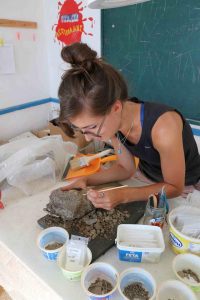 Stephanie Berger (Graduated 2021)
Stephanie Berger (Graduated 2021)
Doctoral Candidate, Anthropology
I am a fifth year doctoral candidate interested in developmental plasticity and the ways that biology embodies social and environmental interaction. Working with skeletal assemblages, I am interesting in combining human biology frameworks with bioarchaeological methods to assess how early environment conditions shape long-term morbidity and mortality outcomes. My dissertation research will examine the diachronic, biocultural impacts of emerging health disparities in the Gran Coclé region of Pre-Columbian Panama.
 Hannah Jahnke (Graduated 2020)
Hannah Jahnke (Graduated 2020)
Ph.D.in Anthropology
Hannah helps lead clinical research at Maven Clinic, where she uses multidisciplinary methods to evaluate the effectiveness of a digital health platform on improving maternal and child health. Prior to this work, Hannah completed a postdoctoral fellowship in reproductive epidemiology at the NIH.
Achsah Dorsey (Graduated 2020)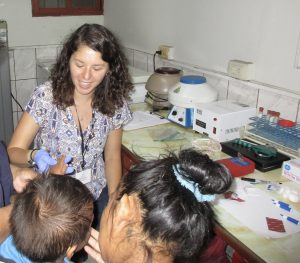
Ph.D. in Anthropology
Achsah is an Assistant Professor of Anthropology at the University of Massachusetts, Amherst. Achsah is interested in using evolutionary medicine and life-history theory along with household and community level ecological approaches to study immune function and nutritional status in women and children. Her current research explores the biological, environmental, and cultural connections between anemia and infection, the gut microbiome, and home environment in children living in a peri-urban community in Lima, Peru.
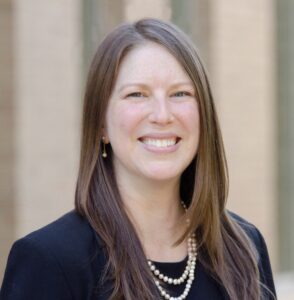 Katie Barrett (Graduated 2020)
Katie Barrett (Graduated 2020)
Ph.D. in Anthropology
Katie Barrett is a postdoctoral fellow at the University of Colorado Denver Children’s Eating Lab. Her current work uses multiple methods to investigate how infants’ and toddlers’ eating behaviors develop, and how those eating behaviors relate to growth. This work includes examining household food environments, parental decision-making, and infant-caregiver feeding interactions.
Ph.D. in Anthropology
Kelly’s work examines the human health effects of environmental and social changes related to economic development, urbanization and population growth in the Ecuadorian Amazon, China and the Galápagos Islands. Her dissertation research investigates the dual burden effects of infectious disease exposure and overnutrition on gut health and immune dysfunction, and how they relate to growth and weight trajectories in children, adolescents and young adults.
